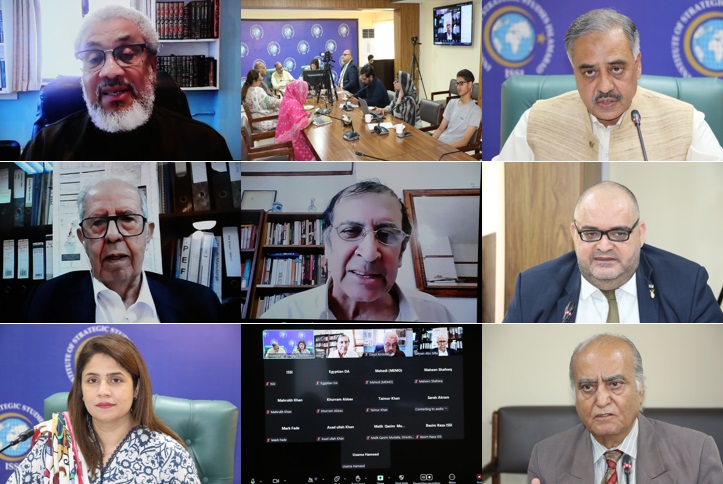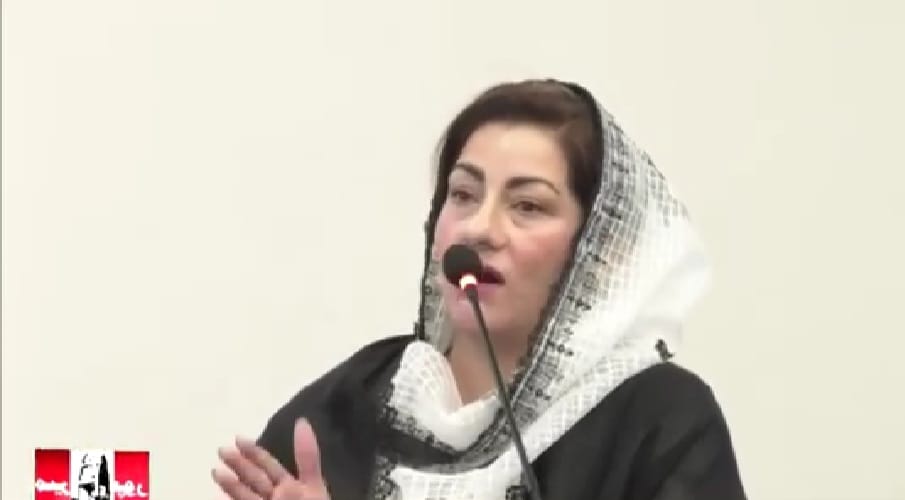ISSI-MEMO Co-host Webinar on “The Future of Palestinian Refugees
Press Release
The Centre for Afghanistan Middle East and Africa (CAMEA) at the Institute of Strategic Studies Islamabad (ISSI), in collaboration with the Middle East Monitor (MEMO), hosted a webinar to mark World Refugee Day, titled, “The Future of Palestinian Refugees.” The webinar was moderated by Ms. Amina Khan, Director CAMEA. The speakers at the webinar included Ambassador Sohail Mahmood, Director General ISSI; Ambassador Khalid Mahmood, Chairman BoG, ISSI; Dr. Daud Abdullah, Director Middle East Monitor (MEMO); Dr. Salman Abu Sitta, Founder and President Palestine Land Society; Dr. Nader Al-Turk, Deputy Head of Mission, Embassy of the State of Palestine; and Prof. Nur Masalha, Palestinian historian.
DG ISSI Ambassador Sohail Mahmood stressed the need to acknowledge the unwavering spirit of refugees the world over. He highlighted how Pakistan has been hosting Afghan refugees since 1979, and remains a major refugee-hosting country despite economic challenges. He noted that according to UNHCR global displacement, driven by conflicts in Gaza, Sudan, and Myanmar, reached 117.3 million people in 2023, including 1.7 million Palestinians displaced in Gaza due to Israel’s war. He described Palestinian refugee crisis, rooted in illegal occupation and dehumanizing treatment by Israel, as one of the longest-standing humanitarian issues. Despite formidable challenges, Palestinian refugees had shown remarkable resilience over the decades. On World Refugee Day, Ambassador Sohail Mahmood called for solidarity with Palestinian refugees and other refugees worldwide, urging the international community to address displacement’s root causes, ensure refugees’ fundamental rights, and help refugees rebuild their lives, emphasizing the need for Palestinians to reclaim what is rightfully theirs.
Ms. Amina Khan highlighted the Palestinian refugee crisis due to Israel’s systematic occupation and oppression since 1948. She said that the ongoing reign of terror that has been unleashed on Palestine amounts to what can only be characterized as genocide has led to further displacement putting into question the right of return for refugees. She said despite Israel’s ongoing atrocities, Palestinians have demonstrated their steadfast determination and resilience. Ms. Khan added that systematic oppression leads to resistance and called for Palestinians’ rightful return to an independent homeland with Jerusalem as its capital.
Dr. Salman Abu Sitta lamented that the issue of Palestinian refugees was being ignored by certain countries while focusing on Israeli hostages, asserting the refugees’ legal right to return despite Israeli usurpation. He added that the international law was on the side of the Palestinian refugees and supported their right to return. He highlighted the UNHCR’s failure to recognize all refugees and called for a future plan with refugees’ voices central. Dr. Sitta urged leveraging global university protests and civil society support for the Palestinian cause, increasing contributions to South Africa’s case against Israel, and more efforts by the Muslim and Arab countries.
Prof. Nur Masalha emphasized understanding the history of the Palestinian issue, highlighting the 1948 Nakba and ongoing expulsions. Noting that Palestinians never voluntarily left their land and were forcibly evicted through systematic actions of the occupying power. He added that international law supports the right of return and stressed empowering refugees. He pointed out that Israel’s refusal nullifies the concept of voluntary repatriation and separates individual rights from collective self-determination. He emphasized the centrality of the refugee issue, stressing that it should be pressed alongside self-determination as both complement each other.
Dr. Nader Al-Turk highlighted the rise in Palestinian refugees since 1948, Israel’s disregard for UN resolutions, and targeting of UNRWA. He noted the impact of the 2018 Trump funding freeze and the displacement of 500 villages. He called for international efforts to address the refugee crisis and hold Israel accountable.
Dr. Daud Abdullah emphasized the right of return for refugees, focusing on repatriation, property restitution, and compensation. He noted that historical agreements have failed to resolve refugee issues justly and argued that political agreements must uphold refugee rights under international law. He also underscored that there was no conflict between right of return and self-determination as both complemented each other.
During his concluding remarks, Ambassador Khalid Mahmood lamented UNRWA’s chronic underfunding and stressed addressing the root causes, ensuring refugee return, property restitution, and compensation. He urged unity among refugees to press their cause more fervently and energetically.




